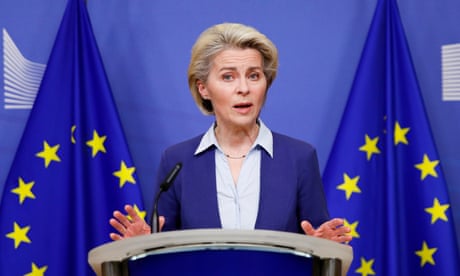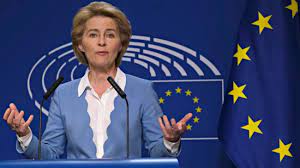Ursula von der Leyen will announce she plans to seek a second term as president of the European Commission at a meeting of the Christian Democratic Union (CDU) party in Berlin on Monday.
The head of the most powerful institution in Brussels, von der Leyen, 65, has been cautiously guarding her intentions for the past year, deflecting all questions on the subject.
But announcing her candidacy for another five years will mark the first step in a four-month battle for election that could involve a wider field, with some speculating Estonia’s prime minister, Kaja Kallas, could be a candidate for the job in the summer when the final choice will be made.
After being selected by the CDU, she must get the backing of two other parties within the European People’s party (EPP), the centre-right grouping in the European parliament, which also includes ruling parties in Greece, Ireland, Lithuania and Sweden.
She must then win a vote at the EPP’s Congress in March, to be held in Bucharest, before facing the final hurdle in June when the real horse-trading over top jobs in Brussels begins.

Under the Spitzenkandidatenprocess, the choice of president of the European Commission is linked to the results of the European Parliament election scheduled for 6-9 June.
But what happens in June will be determined by the percentage vote the EPP commands after the election. In 2019, the EPP won the majority of seats and could have expected their candidate, Manfred Weber, to be appointed to the job. But he was unable to build cross-party support with the socialists, who came in second, putting forward another high-profile candidate, Frans Timmermans.
The split created space for von der Leyen, who was a surprise candidate from the German government. “Remember, nobody had heard of her back in 2019 and she went from being defence minister in Germany to having the most powerful job in Brussels within weeks,” said one diplomat, recalling she didn’t even campaign for the job.
In the post-electoral carve-up, more eyes are likely to be on the other top jobs.
The role of chief diplomat, now held by Josep Borrell, is up for grabs, as well as head of the European Council, which facilitates relations between prime ministers and negotiates positions, often in tricky situations such as the recent row with Hungary over funding for Ukraine.
After the election in June, these positions are likely to be split between two of the other big political groupings, currently the socialists and democrats (S&D) and the liberal Renew group of MEPs.









































